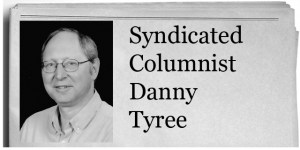Will Scott: Have yourself a merry little Advent
Published 7:16 pm Friday, December 9, 2016

- Werner and Mary Braun: Henry John Deutschendorf Jr.
All you have to do to switch from Thanksgiving to Christmas is plug in the Christmas tree. Seasonal lights wake you up from a turkey-induced stupor. All of a sudden there are gifts to buy and treats to bake. Anticipating this change, the stores have been ready and decorated since mid-October.
At my in-laws house we have made this change rather quickly, too. Traveling for Thanksgiving this year we combined the holidays so we could celebrate them both together — cognizant that we will not be together on Dec. 25. The tree is up and lit. We are plugged into the season. We sing with the old hymn, “O come, let us adore him, Christ the Lord.”
Trending
Unearthing decorations for the celebrations to come, we found some spare Advent candles in the back of a rarely opened closet. Someone bought them for us years ago and we had forgotten to take them out of the package. They lay in the cellophane unlit and ready for an empty wreath and a match. It makes me wonder how many unlit Advent candles are out there.
There is no special greeting for Advent. No “happy Advent.” No “merry Advent.” There are no family Advent recipes or Advent pajamas or ugly Advent sweaters.
Before it became a neglected interlude between the fourth Thursday in November and Christmas Day, Advent was a season of fasting that intended to prepare believers for the coming of Jesus Christ in Christmas. Similarly, the church has used the season of Lent to mark preparations for Easter. This means that many of our Christian ancestors — if they celebrated Christmas at all — spent the forthcoming season avoiding meat and festivity and most certainly anything with the word “fudge” in it.
Looking at the preaching texts for the next few Sundays I can see why our ancestors were not in a festive spirit. The Gospel of Matthew sounds an ominous note: “But understand this: if the owner of the house had known in what part of the night the thief was coming, he would have stayed awake and would not have let his house be broken into. Therefore you also must be ready, for the Son of Man is coming at an unexpected hour” (Matthew 24:43-44). Our ears prick up when we hear something like that.
The prophet Isaiah suggests that calamity will befall Jerusalem. Therefore the people will long for the coming of the Lord when “he shall judge between the nations, and shall arbitrate for many peoples; they shall beat their swords into plowshares and their spears into pruning hooks; nation shall not lift up sword against nation, neither shall they learn war any more” (Isaiah 2:4). This sounds more optimistic but still suggests some of the tension we feel before Christmas: that the world is not as it should be. That’s why we plead, “O come, O come Emmanuel” in the first place.
You have probably received a Christmas card with an image of Mary before. She sings her famous song, “The Magnificat,” near the beginning of the Gospel of Luke. It starts, “My soul magnifies the Lord, and my spirit rejoices in God my savior” (Luke 1:46b-47). There’s the festivity we have been waiting for! What follows does not make it onto the Christmas card, however: “He has shown strength with his arm; he has scattered the proud in the thoughts of their hearts. He has brought down the powerful from their thrones, and lifted up the lowly” (Luke 1:51-52). The coming of the Lord comes with a turbulent reversal. It is not all celebratory — at least not for everybody. I think that is why it doesn’t make it on the Christmas card.
Trending
The joy that accompanies the savior pairs with a longing that accompanies his absence. It can be hard to celebrate Christmas when we are anxious about the world, or the many Christians in it who cannot celebrate without a threat of violence. It’s hard to celebrate when we are more worried about our depression or divorce or disease. It’s hard to celebrate when there are so many people who will be hungry around all this feasting. It’s hard to celebrate when there is an empty stocking hanging on the mantel for someone who is no longer with us.
That’s why we light Advent candles. We wait for something better. We live in the waiting.
It’s the unwrapped present. It’s the breath before the singing. It’s the head bowed in prayer before the feast.
The theologian Karl Barth said that there can be no empty tomb without a cross.
Surely, there can be no Christ child without an empty manger first.
Will Scott is the pastor of First Presbyterian Church of Dalton.




